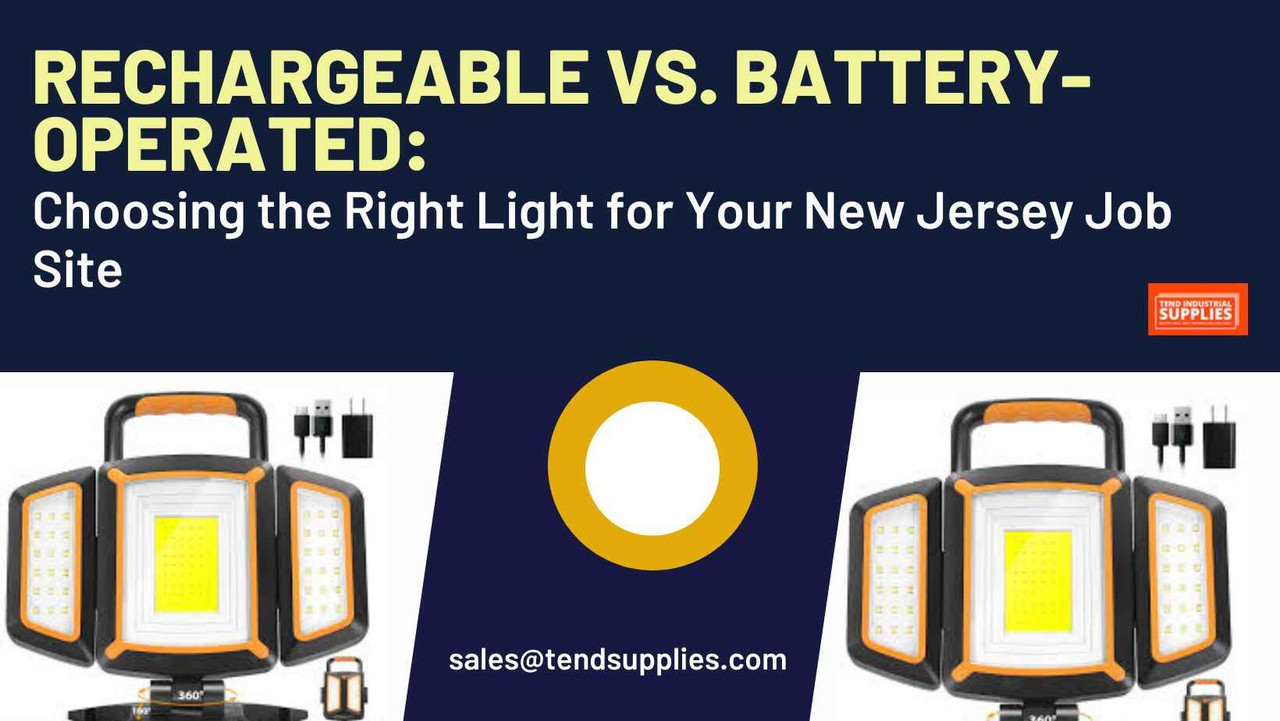Rechargeable vs. Battery-Operated: Choosing the Right Light for Your New Jersey Job Site
Introduction
Adequate lighting is an essential aspect of any job site, playing a critical role in ensuring safety and productivity. In New Jersey, where job sites can range from urban construction zones to remote, rural projects, having the right lighting equipment is a must. Proper lighting reduces the risk of accidents and allows workers to perform tasks accurately, even in low-visibility conditions such as during night shifts or cloudy days. With so many options on the market, one of the most important decisions is whether to invest in rechargeable or battery-operated lights. Each type has distinct advantages that can significantly impact how well your job site functions.
Lighting Options for Job Sites
Job site lighting typically falls into two categories: rechargeable and battery-operated lights. While both serve the same basic function of illuminating your workspace, they differ in their energy source, durability, and cost-effectiveness. Rechargeable lights rely on internal batteries that can be charged through various methods like USB or wall outlets. On the other hand, battery-operated lights depend on disposable or replaceable batteries, offering immediate convenience without the need for recharging.
Understanding these differences is crucial when selecting lighting equipment for your job site. The right choice can streamline operations, save on costs, and reduce environmental impact. Let's explore the benefits and limitations of both options in detail.
Benefits of Rechargeable Lights
Rechargeable lights are a popular choice for many job sites due to their long-term cost savings and eco-friendliness. Since these lights do not require frequent battery replacements, they are more sustainable over time. Although rechargeable lights might have a higher upfront cost, their ability to be used repeatedly without purchasing new batteries results in significant cost savings, especially for long-term projects.
These lights are also highly versatile, often featuring multiple charging options such as USB ports, standard wall outlets, or vehicle adapters. This flexibility makes rechargeable lights ideal for job sites with consistent access to electricity, and they can be kept running during downtime or breaks by charging during off-hours.
Additionally, many rechargeable lights are designed with robust energy efficiency, ensuring longer usage times per charge. For instance, a high-quality rechargeable light can run for several hours on a single charge, even in high-power modes. This makes them excellent for lengthy projects, reducing the need to carry extra batteries.
Benefits of Battery-Operated Lights
While rechargeable lights offer convenience and sustainability, battery-operated lights still hold a significant place in job site lighting due to their portability and flexibility. These lights are powered by disposable or replaceable batteries, meaning they can be used in remote locations where access to electricity is limited or nonexistent. For projects in isolated areas or emergency situations, battery-operated lights provide immediate and reliable illumination.
Another advantage is their lower initial cost. While ongoing battery purchases can add up over time, for short-term projects, battery-operated lights offer a cost-effective solution. They are also lightweight and easy to transport, making them ideal for temporary setups or smaller job sites where heavy-duty lighting isn’t required.
Battery-operated lights are particularly useful for quick or emergency jobs where time is of the essence. Simply replacing the batteries ensures instant operation without the need for downtime while waiting for a device to charge.
Factors to Consider When Choosing Between Rechargeable and Battery-Operated Lights
Selecting the right type of light for your job site involves considering several critical factors. These include the nature of the work, the duration of the project, and the accessibility to power sources. Below are some of the key considerations to help you decide:
1. Project Duration and Location:
If your job site is located in an area without reliable access to electricity or if the project is short-term, battery-operated lights may be more suitable. On the other hand, rechargeable lights are more efficient for long-term projects where access to charging stations is available.
2. Cost Efficiency:
While rechargeable lights may come with a higher upfront cost, they save money in the long run by eliminating the need to continually purchase disposable batteries. Battery-operated lights may seem cheaper initially, but ongoing battery costs can add up quickly, especially for larger job sites.
3. Environmental Impact:
For job sites that prioritize eco-friendly practices, rechargeable lights are the greener option since they reduce battery waste. Battery-operated lights, while convenient, contribute to environmental degradation through the disposal of spent batteries.
4. Ease of Use and Portability:
Battery-operated lights tend to be lighter and more portable, making them ideal for quick setups or emergency situations. Rechargeable lights are typically heavier due to their internal batteries, but they make up for this with longer-lasting performance.
5. Brightness and Power Output:
When choosing between the two, also consider the brightness and power output required for your specific job. Some rechargeable lights offer adjustable brightness settings, which can be particularly useful for tasks that require varying levels of illumination. Battery-operated lights, on the other hand, may offer fewer customization options but can still be highly effective for basic lighting needs.
Specific Applications of Rechargeable and Battery-Operated Lights in New Jersey Job Sites
In New Jersey, where job sites can vary from urban developments to rural and coastal projects, the choice between rechargeable and battery-operated lights can be influenced by specific environmental and project-related factors. Here are some examples of where each type of light might excel:
- Rechargeable Lights: These are ideal for larger construction sites, factories, and warehouses in areas with stable power supply. For instance, construction projects in urban areas like Newark or Jersey City can easily set up charging stations, allowing workers to keep their lights powered throughout the day. Rechargeable lights are also a preferred choice for night shifts on industrial sites or when working in enclosed spaces like tunnels, where prolonged lighting is necessary.
- Battery-Operated Lights: For more remote job sites or temporary setups, such as those in rural areas like Sussex County, battery-operated lights are indispensable. Roadwork projects, emergency repairs, and rural infrastructure development often benefit from the mobility and instant functionality of battery-operated lights. These lights are also a lifesaver for electricians or maintenance teams who need portable lighting in hard-to-reach areas without a power grid.
Case Study: Job Sites in New Jersey Using Rechargeable and Battery-Operated Lights
Consider a large-scale highway construction project along the New Jersey Turnpike. In this case, the team used a combination of rechargeable and battery-operated lights. For consistent, ongoing work at night, the team relied on rechargeable floodlights with high lumens to illuminate the entire site. However, for specific tasks like road repairs or emergency fixes in areas farther from power sources, battery-operated spotlights were used due to their portability and ease of use.
Another example comes from a construction project in the Pine Barrens region. The site required portable, durable lights as it lacked permanent power infrastructure. The team opted for high-powered battery-operated lights that could be easily carried from one work zone to another, ensuring safety and visibility throughout the entire project.
Frequently Asked Questions (FAQs)
1. Which is more cost-effective: rechargeable or battery-operated lights?
Rechargeable lights are generally more cost-effective in the long run, as they eliminate the need for continuous battery purchases. While they may have a higher initial cost, their longer lifespan and ability to recharge make them a better long-term investment compared to battery-operated lights, which require frequent battery replacements.
2. Can I use both rechargeable and battery-operated lights on the same job site?
Absolutely. Many job sites benefit from using a combination of both. Rechargeable lights can provide consistent, bright lighting for larger areas, while battery-operated lights can be used for portable, task-specific purposes. This hybrid approach ensures flexibility and maximizes efficiency on the job site.
3. How long do rechargeable lights typically last on a single charge?
The runtime of rechargeable lights depends on the model and brightness setting. High-quality rechargeable lights can run for 2 to 8 hours or more on a single charge, depending on the intensity of the light being used. Always check the product specifications to understand its power capacity and runtime.
4. Are rechargeable lights more environmentally friendly than battery-operated ones?
Yes, rechargeable lights are more environmentally friendly because they reduce battery waste. Battery-operated lights contribute to environmental pollution due to the frequent disposal of spent batteries, while rechargeable lights allow for reuse over long periods with minimal environmental impact.
5. What should I consider when choosing between rechargeable and battery-operated lights?
Key factors include the duration of the project, access to charging stations, the portability required, initial cost, and environmental considerations. If you have access to power, rechargeable lights may be more efficient. However, if your job site is remote or mobile, battery-operated lights may offer greater convenience.
Related Article
Never Run Out of Light with Rechargeable Battery Work Lights: The Ultimate Guide
Eco-Friendly Lighting: The Impact of Rechargeable LED Lights
Choosing between rechargeable and battery-operated lights for your New Jersey job site ultimately depends on your project’s unique requirements. Rechargeable lights are ideal for long-term projects with access to charging infrastructure, offering cost savings and environmental benefits over time. Battery-operated lights, however, provide unmatched portability and are essential for emergency situations or short-term projects where convenience and mobility are paramount.
Both options serve distinct purposes, and many job sites in New Jersey benefit from using a combination of both. By understanding the advantages of each type of lighting, project managers and workers can ensure that their job sites remain safe, efficient, and well-lit, no matter the challenges. Whether you're looking for durable rechargeable lights or reliable battery-operated solutions, Tend Industrial Supplies has you covered.
Visit Tend Industrial Supplies today to browse our wide selection of lighting solutions tailored to meet the needs of your New Jersey job site. Our experts are available to help you find the perfect tools to ensure your worksite remains well-lit, efficient, and safe. Contact us now for personalized assistance and exclusive offers!









